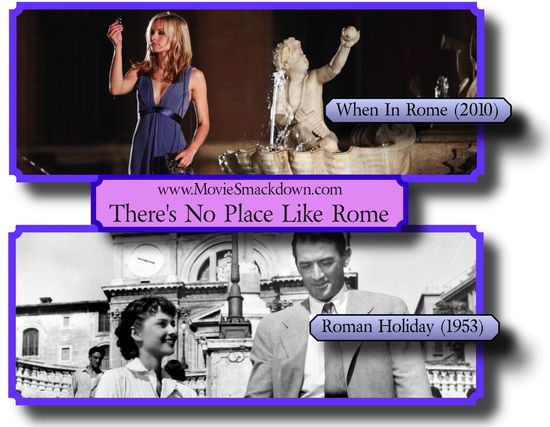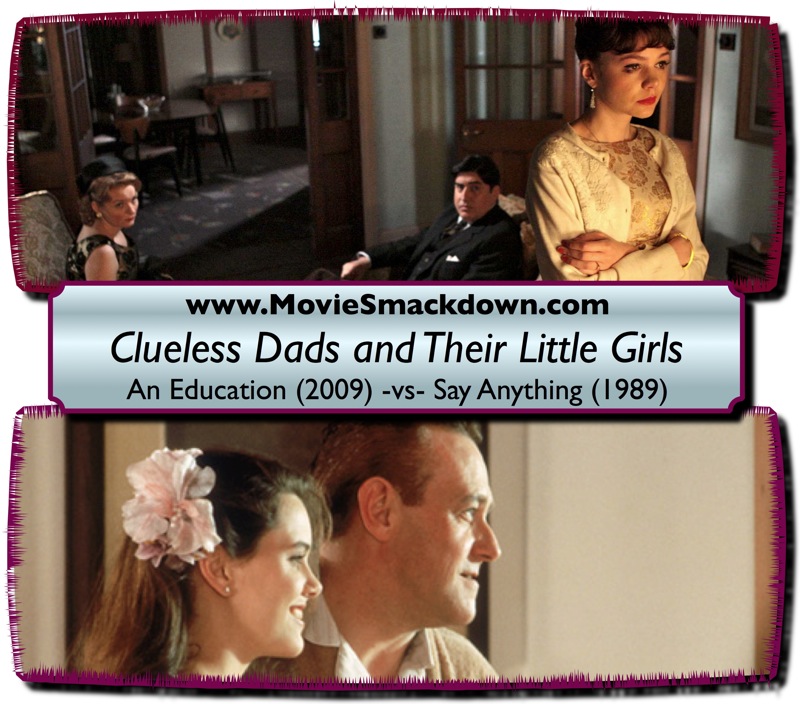
 The Smackdown
The Smackdown
Rome-Antic Comedy makes for a very special subset of my favorite, much- eleaguered genre. Rome Is Where The Heart Is. Isn’t It Rome-antic? With Valentine’s Day and all of its attendant delights and disappointments lurking only weeks away, we’re in the mood for love. (I employ the royal we, signifying myself.)
Filmmakers use European capitals Rome and Paris to goose romance; both cities boast plenty of fabled fountains, fantastic food, familiar
landmarks, and first-rate (or at least first-run) films. “When In Rome,†the
first-run comedy in consideration here, goes head to head with heavyweight
“Roman Holiday.†Even though the outcome is hardly an open question, let’s put
Touchstone’s little David in the ring with Goliath and see what happens next.
[singlepic id=255 w=320 h=240 float=right]
The Challenger
Featuring precious little Rome and a lot of Antic, “When In Rome†falls back on every exhausted (and exhausting) rom-com convention in the book. In Rome for her sister’s wedding, a career woman cynically steals coins from a fountain and unknowingly makes five strangers fall madly in love with her. Kristen Bell makes for an adorable lead who needs fresher and smarter material to reach her full rom- om heroine potential. Josh Duhamel stands tall as her love object, slightly less generic than the usual rom-com Ken doll. There’s not much standing in their way, no real obstacles, and therein lies the rub. The two meet semi-cute in the first ten minutes, and we know they’ll wind up together; nothing much happens in the middle to call their happy ending into question. There’s much ado about the nothing; pilfered coins, local legend, and enchanted suitors sound like more fun than they are.
[singlepic id=15 w=320 h=240 float=right]
The Defending Champion
Romantic comedies don’t often garner ten Academy Award nominations, let alone win three. But then, most comedies don’t feature Audrey Hepburn in her first American film. William Wyler helms this classic fairy tale shot entirely on location in Rome. Hepburn brings her uniquely royal bearing to the role of a runaway rebel princess who meets her Prince Charming (Gregory Peck) and spends a romantic and scandalous night and day exploring what it might be like to travel incognito. Rome is glorious in black and white, and their chemistry together is undeniable.
Peck plays Joe, a journalist with a truly funny sidekick, photographer Irving (Eddie Albert) who recognizes the princess and plays paparazzi. Hepburn and Peck are gorgeous together — impossibly slim and still classically stylish. Their romance is utterly convincing, and the twin themes of fame and privacy are timeless.
(For those of you unfortunates who’ve not seen the film,
I’ll spare you spoilers as much as I humanly can. Promise me that you’ll open
up another browser window and add it to your Netflix queue this instant or hie
thee to a Blockbuster at your earliest opportunity.)
The Scorecard.
Four comic actors of some renown flail around desperately in their “eccentric†enchanted suitor characters, scraping for laughs and broad comedy; Danny DeVito, Will Arnett, Jon Heder, and Dax Shepard have rarely been so ill-used. Their clown car chases, pratfalls, sausage jokes, public nudity, and magic tricks fail to ignite the festivities, and their heart-tugging “Wizard-of-Oz†referencing farewells fall equally flat. Don Johnson and Peggy Lipton look great as Bell’s parents in roles reduced to glorified cameos. Anjelica Huston runs Manhattan’s Guggenheim Museum and bosses Bell around; you’d have to look long and hard to find a less convincing workplace. Amazingly, the filmmakers shot on location in the actual museum; one hopes Touchstone paid the cultural landmark a tidy enough sum to cover the institution’s shame-spiraling loss of credibility.  Both romantic leads have “funny†workplace friends, unattractive underlings (Kate Micucci and Bobby Moynihan) who appear in their home lives and apartments oftener than most real world co-workers might. Neither second has any life of his/her own; the screenplay resolutely (and foolishly) efuses to allow the foils to even meet. The eunuch and the dowdy maiden might have, in Shakespeare’s day,  found love with a counterpart, the equal (if lesser) match. “Roman Holiday”  won Academy awards or Best Actress Audrey Hepburn, Best Original Story (awarded to then blacklisted) Dalton Trumbo and another for the ubiquitous Costume designer Edith Head. Its  other seven nominations included: Best Picture, Best Supporting Actor (Eddie Albert), Best Director, Best Screenplay (Ian McClellan Hunter and John Dighton), Best Black & White Cinematography, Best Black & White Art Direction/Set Decoration, and Best Film Editing. So. In 1953, “Roman Holiday†worked its magic just fine. In the old days, filmmakers didn’t always lean on formulas.
Perhaps because they were still inventing the formulas, happy endings weren’t always insured; audience expectations and responses were perhaps less tested, less Pavlovian. “Roman Holidayâ€Â works so well over half a century later because its happy ending remains a question mark until the film’s final frame. The impediments to their romantic relationship are huge; the issues raised are equally monumental and universal. This is no lightweight rom-com; the arguments made are not didactic in the least. Both the princess and the tabloid journalist grapple with dilemmas that are far from fantastical. his is an adult film featuring adults making crucial, difficult decisions;  fulfilling their obligations fully would fly directly in the face of the pursuit of their personal happiness. “When In ome†grapples for a few moments with the notion that love must be real, not an enchantment. This isn’t much of a real moral dilemma; after all, Beth’s sister marries a man she has just met. Is not love at first sight enchantment without the bogus magical explanation? The nature of love is bandied about throughout the film; truisms spout thick and fast like greeting card sentiments. Love is something one must be open to. Love is something that makes you want to help the beloved achieve their dream. Blah blah blah.
The Decision
“Roman Holiday.” Duh. Of course, “Roman Holiday†wins this (and almost any other) Smackdown. And yes, I could have selected a crummier rom-com and stacked the critical deck in any direction. But here’s the thing. I have a point to make. The truly great romantic comedies do not follow formulas. The truly great romantic comedies are about much more than meeting cute and ending  at some altar. The truly great romantic comedies touch our hearts and genuinely move us. One has to ask what’s gone so dreadfully wrong with the system that the rom-coms we get are so much less than the rom-coms we want. Enough with the sausage factory. Kristen Bell may not be Audrey Hepburn, but she, and we, deserve far better than this.




When in Rome may fall flat in places, but at least it hasn’t had all the personality manicured out of it.
Sherry,
When In Rome is a sad comparison to Roman Holiday.
Since you are the “go to” expert, would you happen to know the actual name of the church featured, and the piazza where the fountain is located? Rome itself(or the little we saw) was more impressive than the entire movie! Sandra
“Featuring precious little Rome and a lot of Antic”… That’s just great. You write like Carrie Bradshaw would if she were actually a good writer. And a movie critic. And a real person.
Funnily enough, they screened Roman Holiday last night here in Australia on ABC2, it was the first time I’d actually watched it! Great film, I do so love to watch the awesome Gregory Peck in action (and Hepburn is an utter delight!). Rome not only looks great in Black and White, but it’s even better in colour! Great review, great result.
BTW: Bartko, welcome aboard!
You are a good writer. I keep wanting to argue with you, but I haven’t found a review of yours that I disagree with yet. Keep writing, I’m sure there will be one.
To channel Mr. T for a second, I pity the fool film that goes up against Roman Holiday! What surprises me every time I watch it is how charming Peck is since I usually find him too stiff with moral rectitude. By the way, I read in Jean Simmons’ obituary that she was offered the lead first, but the dastardly Howard Huges would not lend her from RKO. She graciously told Hepburn at the premier that Audrey had done a better job than she could have.
Roman Holiday should probably be added to your list of romantic comedies….take out The Graduate. Gregory and Audrey together in black and white. Yes, we will put it on our next Netflix order. Thanks for reminding us.
Shucks. Thanks, Bartko. We love you too.
What is this website? I’ve never seen anything like this — I thought it was odd — but now I’ve read seven of these things in a row. Great fun, great writing. By the way, good deal having polls for the Best Screenplay, that is so cool…